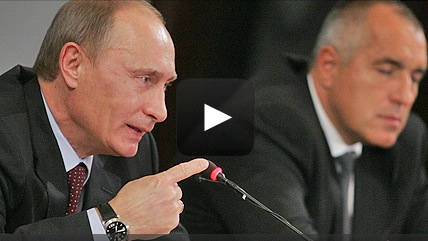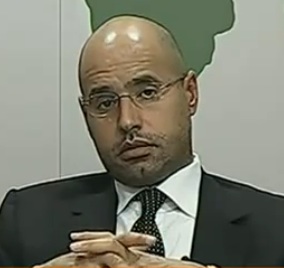"Revenues from 'one million barrels of oil per day' go entirely to 'five or six princes'."
-- Cable from the U.S. Embassy in Riyadh, Saudi Arabia
A secret 1996 cable -- sent from the U.S. Embassy in Riyadh, Saudi Arabia and released by Wikileaks -- offers a detailed account of the mechanisms of wealth distribution and waste within Saudi Arabia's royal family. Despite the considerable riches doled out to "thousands" of Saudi princes and princesses, the cable observes that Saudi royals "seem more adept at squandering than accumulating wealth." (The embassy notes that the country has more commoner billionaires than royal billionaires.) As reported in the cable, corruption also abounds largely unchecked.
Oil revenue is said primarily to enrich the Al Saud. The embassy explains that Saudi Arabia's Ministry of Finance distributes a portion of the country's oil proceeds to each Saudi royal family member in the form of monthly stipends. At the time the secret cable was issued, every royal reportedly received a monthly allowance from birth, on a sliding pay scale of US$ 800 (for distant royals) to US$ 270,000 (for sons and daughters of King Abd Al-Aziz). The embassy calculated these stipends to total more than US$ 2 billion of the Saudi government's US$ 40 billion annual budget. For this and other reasons, the embassy concludes that "getting a grip on royal family excesses is at the top" of priorities for Saudi Arabia.
In addition to the state-budgeted stipend, the cable reports, a royal may obtain a bonus of as much as US$ 3 million, as reward for getting married or building a palace. The existing stipend-and-bonus system provides Saudi royals with a significant incentive to procreate, particularly since stipend distributions begin at birth. It was stated that the central life aspiration of one Saudi prince was to have more children, so as to increase his monthly allowance.

A diplomatic cable of the US embassy in Sofia, dated October 2, 2008, has been revealed on WikiLeaks, focusing on Bulgaria's energy dependence from Russia.
The report titled "BULGARIA AND THE ENERGY KNOT: SCENESETTER FOR OCT 7 VISIT OF SPE GRAY," has been sent by then US Ambassador in Sofia, Nancy McEldowney to Boyden Grey, at the time Special Envoy for European Affairs and Special Envoy for Eurasian Energy at the Mission of the United States to the European Union, ahead of his visit to Bulgaria.
The Bulgarian dependency is described by the Ambassador almost pornographically with the following words: "But the cartoon strip portraying a passionately eager Bulgaria in bed with the muscle bound duo of Gazprom and Lukoil is only partially true -- it is a tryst driven less by passion and more by a perceived lack of options."
The cable is revealed after the Bulgarian Government revoked the license of one of the "muscle bound lovers": the local refinery of the Russian oil giant Lukoil, who was forced to halt operations for at least a month and a half.
Тhe Director of the Bulgarian Customs Agency, Vanyo Tanov explained that the refinery cannot operate without the required electronic measuring devices Lukoil failed to install in its storage facilities, and can deal only with the fuels already outside the plant.
 BBC’s report on US State Embassy cables from WikiLeaks detailing the “hidden agenda” of northern Arctic states has led Greenpeace to call “on the Arctic Council to place an immediate moratorium on industrial exploitation within the area that has historically been covered by sea ice.”
BBC’s report on US State Embassy cables from WikiLeaks detailing the “hidden agenda” of northern Arctic states has led Greenpeace to call “on the Arctic Council to place an immediate moratorium on industrial exploitation within the area that has historically been covered by sea ice.”
Truls Gulowsen, Arctic campaign leader for Greenpeace Nordic, writes, “What the Arctic needs in this time of extreme external pressure is a protection against additional threats from dangerous shipping, oil exploitation, bottom-trawling, over-fishing and other destructive industrial practices.” Gulowsen also points out the “more immediate and more dangerous safety issue” is that moves into the “fragile Arctic to drill for oil” will create a threat of oil spills and likely impact the marine environment.
The Financial Times post on the cables highlights some of the noteworthy revelations in the cables:
[UPDATE - 2010-03-09]
The Middle East Institute has posted video of a US-Libya business relations event that WL Central mentioned previously. The event called "US-Libya Relations: Surviving the WikiLeaks Controversy?" featured two individuals, David Mack and Charles Dittrich, with connections to the US-Libya Business Association.
The person introducing the event in the video (presumably a person with the Middle East Institute which hosted the panel) explains the WikiLeaks cables released on Libya rocked the relationship between the US and Libya. "The US' very able ambassador to Libya, Gene Cretz, was quoted in secret cables as talking about Muammar Gaddafi's reliance on a voluptuous blond Ukrainian nurse. That did not go down well in Tripoli."
Ambassador Cretz was recalled. But, as Mack says when he gets up to speak, a meeting in mid-December was held between business leaders from the US and Tripoli and there was a willingness to push onward and forget what had been revealed.
Previous post which appeared on 2010-02-22 appears below.

The only people more terrified of the foreign mercenaries or anti-aircraft missiles or the fighter jets deployed to shell protesters than Libyans are the businessmen working for oil and gas companies in Libya. In fact, this whole democracy thing is a nightmare for companies in Libya that fought just over two years ago to ensure the market in Libya would not be restricted by an amendment that aimed to prevent companies from doing business with rogue states designated as state sponsors of terrorism.
Financial Times reports escalating violence in Libya has kept oil prices at two and a half year highs. Many of the oil ports and refineries are now shut down. International oil companies are evacuating their staff from the "world's 12th largest oil exporter."
All the violence, protest and political tension in Libya and the wider Middle East and North Africa seems to have led the US-Libya Business Association to make a cold calculated decision to disappear from the Internet for the time being until calm returns to Libya. RAW STORY reported on February 21 that the website of the US-Libya Business Association (USLBA) went down.
 An address from Muammar al-Gaddafi’s son, Saif al-Islam al-Gaddafi, was aired on television in Libya early on February 21. Saif al-Islam told Libyans he had come without a prepared speech and was going to speak from his heart and mind.
An address from Muammar al-Gaddafi’s son, Saif al-Islam al-Gaddafi, was aired on television in Libya early on February 21. Saif al-Islam told Libyans he had come without a prepared speech and was going to speak from his heart and mind.
The address (which you can read here) was given as Tripoli was turning into more of a battlefield. Snipers were firing in Saha Al Khadra. His father’s “thugs” were allegedly going into hospitals and killing Libyans who had been out in the streets and been wounded.
Rumors are circulating that Saif al-Islam was shot. Some of the unconfirmed reports say Saif al-Islam is dead and his father and some from the Gaddafi family has fled. Muammar has gone to Venezuela, some reports allege.
The death of Saif al-Islam is possible, but until there are reports which go beyond unconfirmed, this is largely a distracting story. What Saif al-Islam said in the recorded address that aired on February 20 is much more important.
Saif's Address to Libya
Theme by Danetsoft and Danang Probo Sayekti inspired by Maksimer